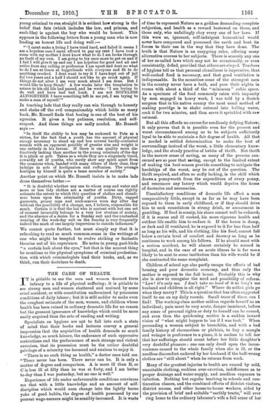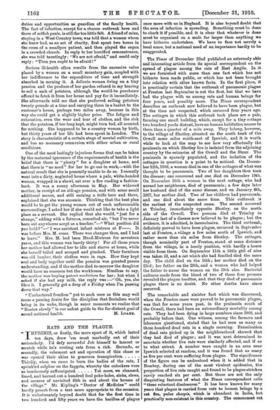THE CARE OF HEALTH.
IT is pitiable to see the men and women doomed from infancy to a life of physical suffering; it is pitiable to see strong men and women shattered and maimed by some cruel accident, or with constitution undermined by poisonous conditions of daily labour ; but it is still sadder to make even the roughest estimate of the men, women, and children whose health has been ruined in ordinary domestic life for no reason but the grossest ignorance of knowledge which could be more easily acquired than the arts of reading and writing.
Specialists on hygiene are apt to fall into such a state of mind that their books and lectures convey a general impression that the acquisition of health demands so much knowledge, so much leisure, the endurance of such oppressive restrictions and the performance of such strange and violent exercises, that its possession must be the rather doubtful privilege of a minority too harassed and anxious to enjoy it.
"There is no such thing as health," a doctor once told me. "Thera never has been. There never can be. It is only a matter of degree and comparison. A is more ill than B, or C is less ill at fifty than he was at forty, and I am better to-day than I was yesterday, but no one is well."
Experience of life under unfavourable conditions convinces me that with a little knowledge and an amount of self- discipline which would soon change into the lightly borne yoke of good habits, the degree of health possessed by our poorest wage-earners might be sensibly increased. It is waste
of time to represent Nature as a goddess demanding complete subjection, and health as a reward bestowed on those, and those only, who unfailingly obey every one of her laws. If this were so, ignorant, self-indulgent humankind would never have conquered and possessed the earth and bent its forces to their use in the way that they have done. The truth is that Nature is an easygoing ruler, offering many alternative courses to her subjects. There is scarcely any one of her so-called laws which may not be occasionally, or even consistently, defied, provided that others are obeyed. Teachers of hygiene tell us that personal cleanliness is imperative, that well-cooked food is necessary, and that good ventilation is indispensable. In the meantime some of the strongest men in the country never have a bath, and pass their nights in rooms with about a third of the " minimum " cubic space. As a specimen of the food commonly eaten with impunity by men engaged in heavy work, I was told by a Scotch surgeon that in his native county the most usual method of making porridge is to shake oatmeal into boiling water, cook it for two minutes, and then serve it sprinkled with raw oatmeal.
But all this affords no excuse for needlessly defying Nature; it only proves that it is possible even for the poorest and worst circumstanced among us to be subjects sufficiently loyal to be able to maintain a fair degree of health. All that is needed is settled determination to make the best of surroundings instead of the worst, a little elementary know- ledge, and the steady practice of habits of thrift. Not thrift in the narrow sense of saving, as many of the persons con- cerned are so poor that saving, except to the limited extent of making the best season provide something to mitigate the hardships of the worst, may be out of the question. - The thrift required, and often so sadly lacking, is the skill which draws a pennyworth from the expenditure of every penny, and renounces any luxury which would deprive the home of decencies and necessaries.
Unsatisfactory conditions of domestic life affect a man comparatively little, except in as far as he may have been exposed to them in early childhood, or if they should drive him to seek consolation in strong drink, or amusement in gambling. If food is scanty, his share cannot well be reduced; if it is coarse and ill cooked, his more vigorous health and outdoor life enable him to endure it. If the house is damp, or dark and ill ventilated, he is exposed to it for less than half as long as his wife, and his clothing, like his food, cannot fall below a certain level of comfort and decency as long as he continues to work among his fellows. If he should meet with a serious accident, he will almost certainly be nursed in hospital, and in the case of an acute illness he is far mote likely to be sent to some institution than his wife would be if she contracted the same complaint.
Children of school age also partly escape the effects of bad housing and poor domestic economy, and thus only the mother is exposed to the full brunt. Probably this is why she is slow to recognise the need and possibility of reform. "Law ! it's only me. I don't take no heed of it so longs me husband and children is all right." Where do selfish girls go when they marry P This is a question that has often suggested itself to me on my daily rounds. Small trace of them can I find ! The working-class mother seldom regards herself as an individual; pain must be very acute, danger imminent, before any sense of personal rights or duty to herself can be roused, and even then the quickening motive is a sudden inward vision of "what might happen to 'em if I was took." When persuading a woman subject to bronchitis, and with a bad family history of rheumatism or phthisis, to buy a mangle and wringer in preference to a piano, it is useless to tell her that her sufferings should count before her little daughter's very doubtful pleasure : one can only dwell upon the incon- venience caused to the whole family when she is ill, or the needless discomfort endured by her husband if the half-wrung clothes are "still about" when he returns from work.
Many of the greatest injuries to health are caused by cold, unsuitable clothing, reckless over-exertion, indifference as to proper drainage and water-supply, and needless exposure to infection. Nothing but regular teaching in schools and con- tinuation classes, and the combined efforts of district visitors, district nurses, and other house-to-house workers, aided by the provision of brief and suitable " earthly tracts," will ever
ring home to the ordinary labourer's wife a full sense of her duties and opportunities as guardian of the family health. The fact of infection, except for a chance outbreak here and there of selfish panic, is still far too little felt. A friend of mine, staying in a West Country town, was told that a woman whom she knew had, as an act of charity, first spent two hours in the room of a smallpox patient, and then played the organ in a crowded church. In reply to her horrified remonstrance, she was told tauntingly : ' We are not afraid," and could only reply : " Then you ought to be afraid!"
Serious ill-health often results from the excessive value placed by a woman on a small monetary gain, coupled with her indifference to the expenditure of time and strength absorbed in earning it. A delicate woman living on a tiny pension and the produce of her garden refused in my hearing to sell a sack of potatoes, although the would-be purchaser offered to fetch it from her house and pay for it immediately. She afterwards told me that she preferred selling potatoes twenty pounds at a time and carrying them in a basket to the customer's house, perhaps two miles away, because in this way she could get a slightly higher price. The fatigue and exhaustion, even the wear and tear of clothes, and the risk that the potatoes, if too long kept, might turn bad, all counted for nothing. She happened to be a country woman by birth, but thirty years of her life had been spent in London. The story is characteristic of a certain stage of mental cultivation, and has no necessary connexion with either urban or rural conditions.
One of the most lastingly injurious forms that can be taken by the maternal ignorance of the requirements of health is the belief that there is " plenty " for a daughter at home, and that there is " no need " for her to go out to work,—with the natural result that she is presently unable to do so. I recently went into a dirty, neglected house where a pale, white-handed woman, wrapped in a shawl, sat over a fire reading a fashion- book. It was a sunny afternoon in May. Her widowed mother, in receipt of an old-age pension, and with some small additional means, and still earning a trifle here and there, explained that she was anaemic. Thinking that the best plan would he to get the young woman out of such unfavourable surroundings, I asked her if she would not like to take a light place as a servant. She replied that she would, " just for a change," adding with a fatuous, conceited air, "but I've never been out anywheres acept as a teacher."—" What position did you hold ?"—" I was assistant infant mistress at F—. It was before Mrs. M. come. There was changes then, and I had to leave." Mrs. M. had been Head-Mistress for seventeen years, and this woman was barely thirty ! For all those years her mother had allowed her to idle and starve at home, while she herself toiled and scraped and pinched. Their furniture was old lumber, their clothes were in rags. How they kept soul and body together until the pension was granted passes understanding, and if the mother died to-morrow the daughter would have no resource but the workhouse. Needless to say, the mother was buying patent medicines for her ; but when I asked if she had any milk, the reply was :—" Oh, yes, she likes it. I generally get a drop of a Friday when I'm passing down that way."
" Unehartered freedom " put to such uses as this may well rouse a passing desire for the discipline that Socialism would bring in its wake, though in saner moments we realise that " Hasten slowly " is our safest guide to the far-distant goal of







































 Previous page
Previous page